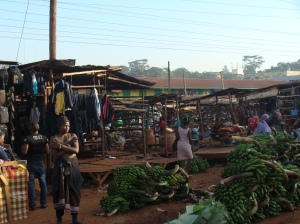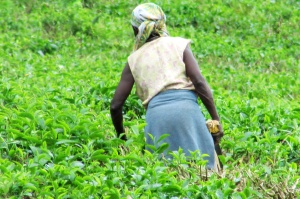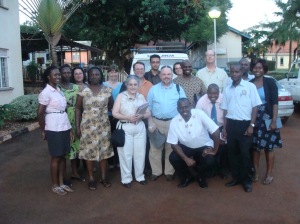The road to Jinja is alive with commerce. All along the sidewalks hugging the winding road, people chat and barter, display and inspect, cook and eat. School children in smart uniforms meander through a maze of bed frames and wooden gates (an impromptu furniture store). Young men donning blue smocks dart between vans with skewers of barbecue chicken and baskets of chilled sodas. Women wrapped in vibrant cloth scrutinize the endless piles of fresh produce and share their evaluations aloud. These aren’t the “sanitized streets” of the Chicago suburbs, as Mukila’s son once remarked, these are public spaces where life is simply lived, where the social function of economic exchange is vividly seen and heard. The energy is both electrifying and contagious, as we couldn’t stop watching and commenting, fueled by the activity whirling around us, soaking up the intoxicating experience.

The end of the road brings us to an entirely different space of exchange. Visiting a tea and a sugar plantation, we are plunged into the radically different world of production. Here, we learn of the production challenges and profit struggles of a tea plantation once left to rot during the Amin period, while we hear of the technological advances and ambitious plans of the thriving sugar plantation. In air-conditioned rooms, flow charts are drawn and PowerPoints are presented. We are far from the magic of the marketplace. When we step back into the heat and dust, we enter the private space of labor. The bustle of people now reveal the production of the commodities: women hacking at an endless row of weeds; men directing streams of tea into burlap sacks; ancient machines whirling as they sift and ground leaves into powder. Management walks us through tea fields and tractor graveyards, always careful to direct our vision away from the workers. One manager holds up the stem of a tea leaf to demonstrate the process of plucking the leaves, but all I can see is the woman behind the leaves, machete hanging by her side, staring at us (in exhaustion? In defiance?). She stares for several minutes before turning back to her weeds. Here is the reality of production obscured by the magic of the marketplace, a sobering realization etched into our memories.

The end of the day takes us into a third social space, one of collective action and responsibility. Neither selling nor making, our final hosts, TASO, present their twenty-seven years of struggle against HIV/AIDS. Their energy is boundless: educational events, community outreach, medical and psychological care, advocacy work, and policy recommendation. Indeed, TASO illustrates how communities can heal individual and social bodies through medical technologies and compassionate services. Instead of hearing corporate pitches of social responsibility (which never correspond to the squalid housing or the absent schools), we met extraordinary people who create a social space that produces care and exchanges in support, an inspiring experience.


Thank you for sharing such a vivid portrait of your first few days! What remarkable insights!
Collegues,
I am thrilled to hear that Bhasker is fine. However, I am now worried as to what you have done to him :)!!. Great to hear from you all. I have been checking your blog daily and am thrilled to get an update. Sounds like this is really going to be a transformative experience for everyone. Thanks again for letting us share in your journey. Take care -Michele`
Thanks for the update! Looking forward to more…
Thanks for sharing all the pictures!!! can’t wait to here more about your amazing experience in Africa-)